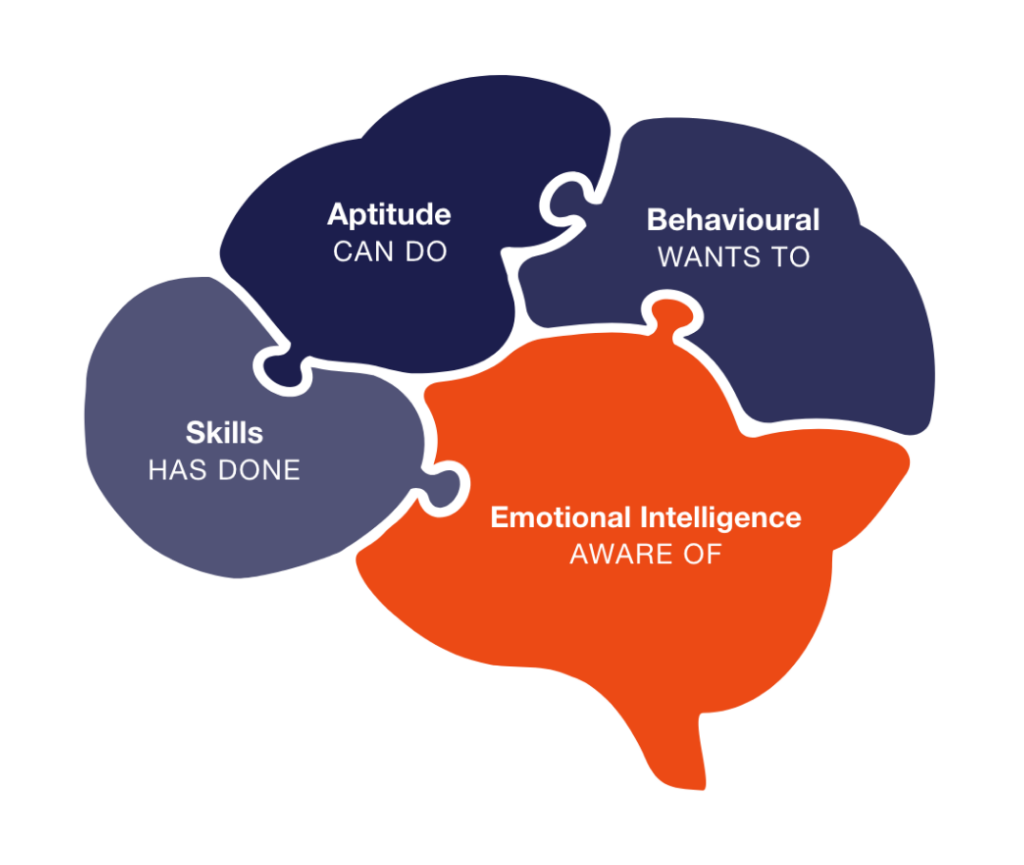EMOTIONAL INTELLIGENCE – AWARE OF
EMOTIONAL INTELLIGENCE
Emotional intelligence assessments identify areas of emotional intelligence including emotional self-awareness, control, expression and reasoning.
Research now indicates that employees with strong emotional intelligence are better leaders, more successful at building high-performing teams, more resilient, and more assertive communicators. Strong emotional intelligence correlates with customer service performance: employee engagement and turnover in customer-facing roles.

Our Emotional Intelligence Assessments
What do Emotional Intelligence Assessments Assess?
Emotional intelligence assessments measure a person’s ability to recognise, understand, and manage emotions—both their own and others’—to improve communication, leadership, and interpersonal effectiveness.
EMOTIONAL INTELLIGENCE
EQ Assessments
Emotional Intelligence is the measurement of an individual’s capacity to use and manage emotions in the workplace. If you require a strong team player or to develop a candidate for a future leadership role, you’ll want someone with a high Emotional Intelligence capacity.
Why? Because the skills and competencies associated with high Emotional Intelligence are manifest in effective leadership, proactive staff, relationship development and outstanding managerial skills.
-
Increase employee retention: Identifies individuals with strong interpersonal and self-regulation skills, leading to better team cohesion and lower turnover.
-
Improve leadership effectiveness: Helps select and develop leaders who can manage emotions, build trust, and motivate teams.
-
Enhance team dynamics: Fosters better collaboration, communication, and conflict resolution within teams.
-
Boost employee engagement: Employees with higher EI tend to be more self-aware, resilient, and aligned with company values.
-
Improve customer service: Emotionally intelligent employees are better at reading and responding to customer needs.
-
Reduce workplace stress and conflict: Helps identify employees who can manage pressure and respond constructively in difficult situations.
-
Support development and coaching: Provides data to tailor learning and development programs to individual emotional strengths and weaknesses.
-
Aid in hiring and promotion decisions: Complements cognitive and behavioural assessments by evaluating how candidates will adapt emotionally to the role and culture.
Competencies and skills measured include
- Effective interpersonal communication skills
- Behavioural management skills such as emotional self-control and management of others
- Cognisance of the emotions of others
- Performance enhancement through positive emotional support
FAQs
What is an emotional intelligence (EI) assessment?
An EI assessment measures a person’s ability to understand, manage, and express emotions effectively, as well as how they relate to others. It provides insights into personal and interpersonal effectiveness in the workplace.
Why should organisations assess emotional intelligence?
Emotional intelligence is linked to better leadership, collaboration, customer service, and overall job performance. Assessing EI helps identify high-potential talent and develop existing staff.
What types of EI assessments does Testgrid offer?
Testgrid offers both ability-based and self-report emotional intelligence assessments, including the Genos EI Inventory, MSCEIT (Mayer–Salovey–Caruso Emotional Intelligence Test), and EI-based 360-degree feedback tools.
Which roles are emotional intelligence assessments suitable for?
EI assessments are ideal for leadership development, team building, customer-facing roles, graduate recruitment, and anyone in roles requiring strong interpersonal skills.
How are the results of EI assessments used?
Results can inform hiring decisions, guide leadership coaching, support personal development plans, and highlight strengths or gaps in emotional competencies.
Are emotional intelligence assessments scientifically valid?
Yes. Testgrid’s EI assessments, including Genos and MSCEIT, are backed by research and validation studies. They are reliable and evidence-based tools for assessing emotional intelligence in workplace settings.
Can emotional intelligence be improved after assessment?
Absolutely. EI is a skill that can be developed. Testgrid provides coaching, workshops, and personalised feedback to help individuals strengthen their emotional competencies.
How long does it take to complete an emotional intelligence assessment?
Most EI assessments take between 30–45 minutes to complete. Some may vary slightly depending on the specific tool and whether it’s a 360-degree assessment.
Enable faster and smarter hiring decisions. Take the first step to streamlining your recruitment process.
TESTGRID CAN HELP TO

35%
Reduction time to shortlist

29%
Increase in sales performance

20%
Reduction in staff turnover

80%
of Fortune 500 companies use psychometric assessments
Request a consult

“Testgrid helped us cut time-to-hire by over 90% while improving diversity and confidently selecting high-potential graduates aligned to our values.”
– Government Employee
RESULTS
Completion Rate
Boosted Candidate Experience (CX)
Improved Diversity
Boosted Hiring Quality

“An integrated resource saving solution which allowed for an efficient selection process.”
– Anthony Takyi | Careers Engagement Lead at Chartered Accountants
RESULTS
Resource Days Saved
Applicants
Candidates successful in final engagement
Reduction in recruitment time



